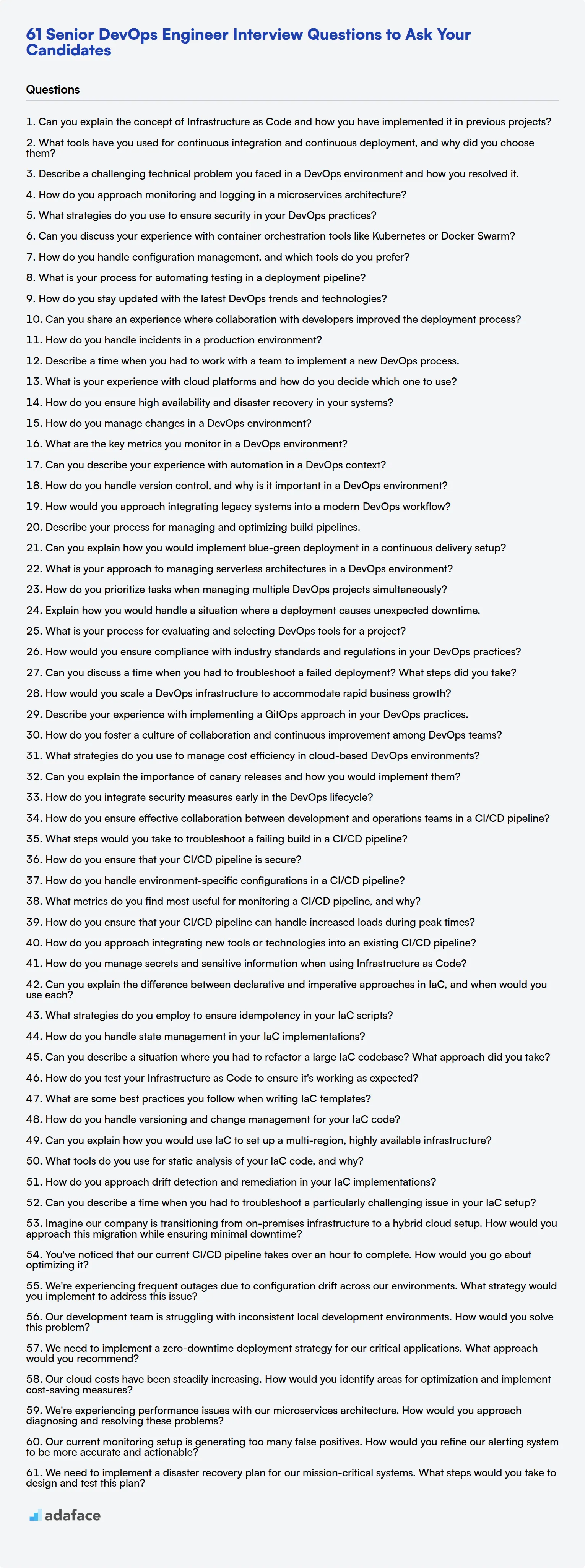Hiring the right Senior DevOps Engineer can significantly impact your organization's efficiency and productivity. This role requires a unique blend of technical expertise, leadership skills, and a deep understanding of DevOps practices.
This comprehensive guide provides a curated list of interview questions tailored for various experience levels, from junior to senior DevOps Engineers. We've organized the questions into categories covering common topics, CI/CD pipelines, Infrastructure as Code, and situational scenarios.
By using these questions, you'll be better equipped to assess candidates' technical knowledge and problem-solving abilities. Additionally, consider incorporating a pre-interview DevOps skills assessment to streamline your hiring process and identify top talent more effectively.
Table of contents
10 common Senior Devops Engineer interview questions to ask your candidates
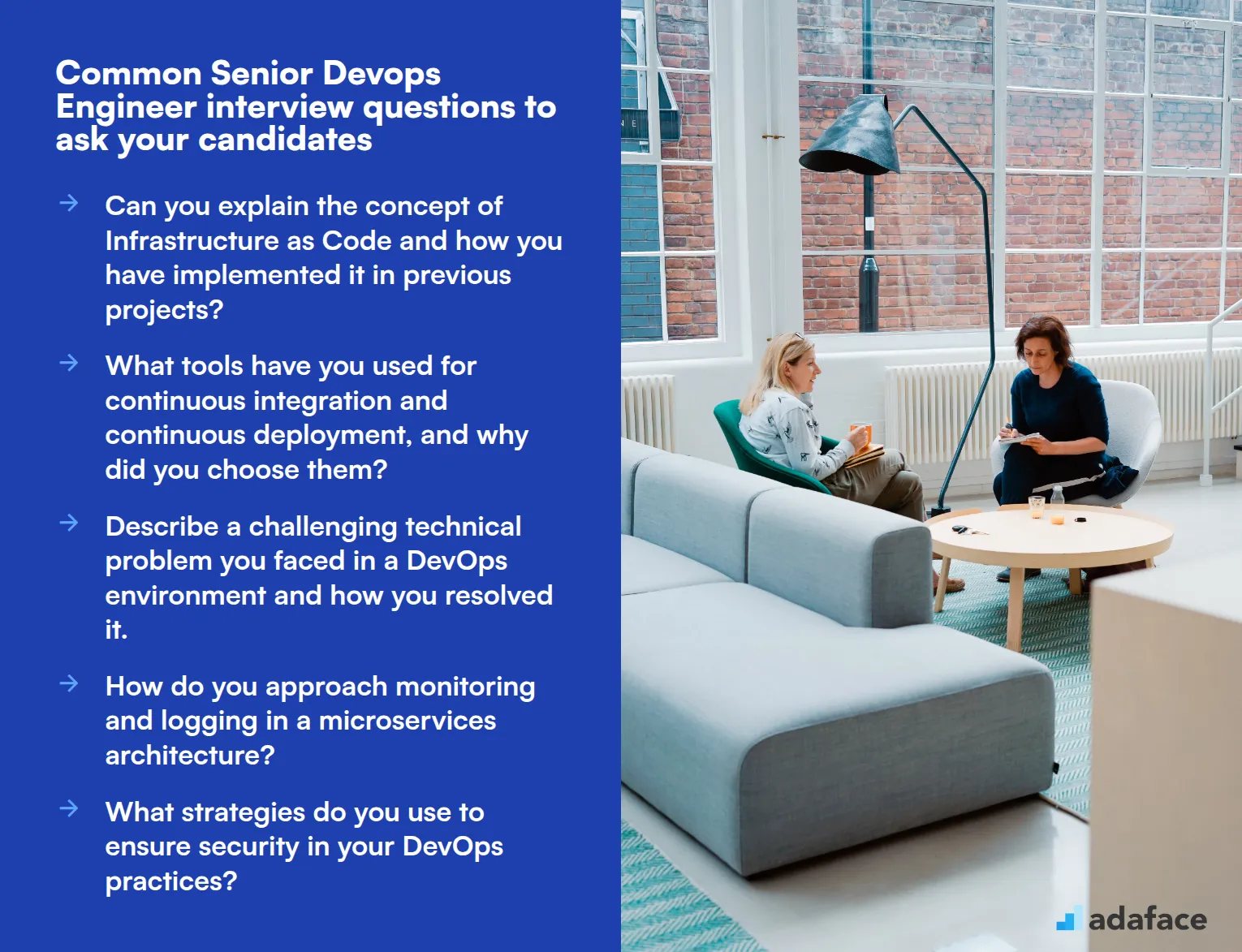
To effectively evaluate the technical skills and problem-solving abilities of your candidates, consider using this curated list of interview questions. These questions are designed to assess the depth of knowledge and practical experience required for a Senior DevOps Engineer role, helping you make informed hiring decisions. For more insights, check out this job description.
- Can you explain the concept of Infrastructure as Code and how you have implemented it in previous projects?
- What tools have you used for continuous integration and continuous deployment, and why did you choose them?
- Describe a challenging technical problem you faced in a DevOps environment and how you resolved it.
- How do you approach monitoring and logging in a microservices architecture?
- What strategies do you use to ensure security in your DevOps practices?
- Can you discuss your experience with container orchestration tools like Kubernetes or Docker Swarm?
- How do you handle configuration management, and which tools do you prefer?
- What is your process for automating testing in a deployment pipeline?
- How do you stay updated with the latest DevOps trends and technologies?
- Can you share an experience where collaboration with developers improved the deployment process?
8 Senior Devops Engineer interview questions and answers to evaluate junior Devops Engineers
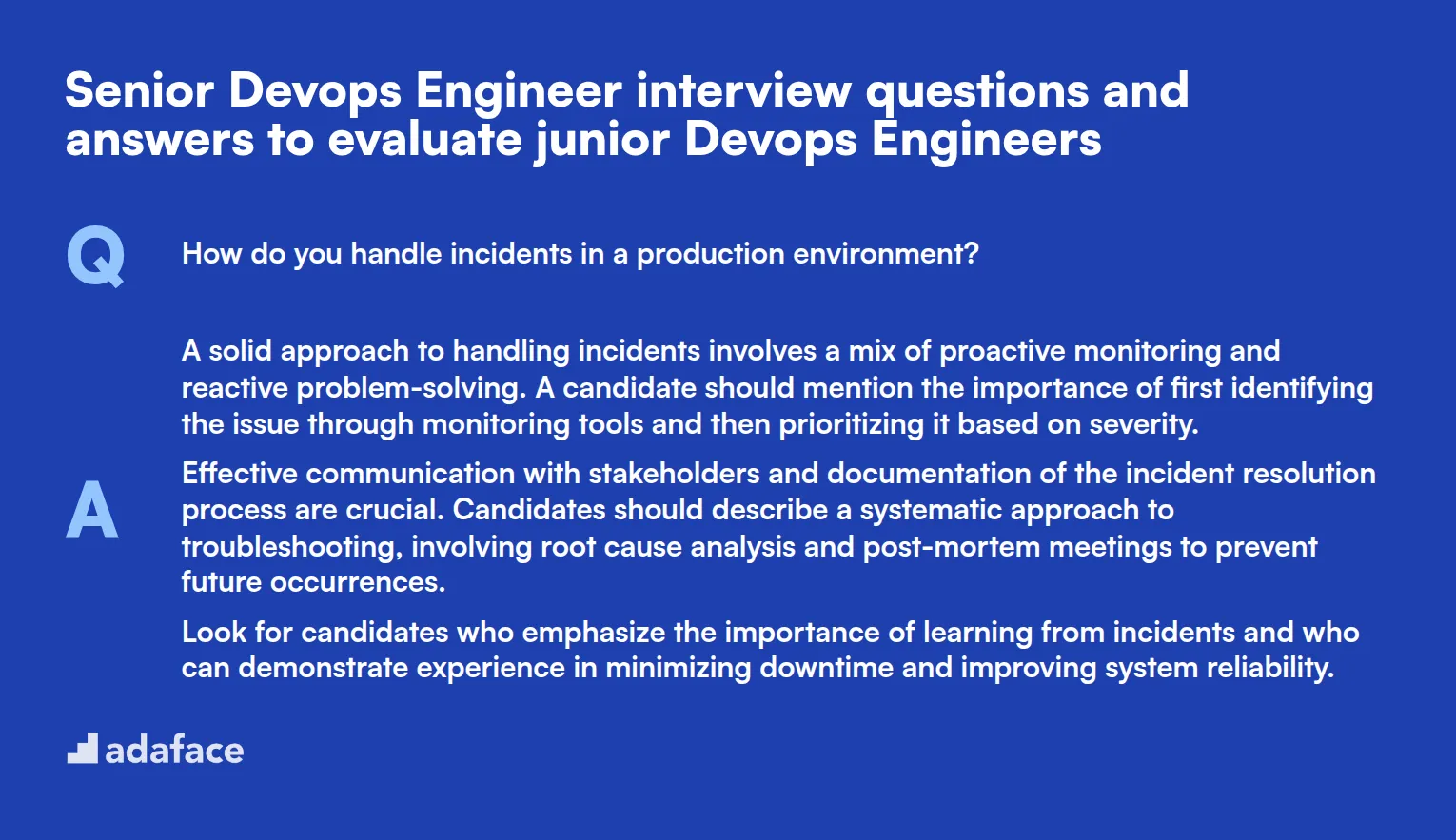
When evaluating junior DevOps Engineers, it’s essential to ask questions that reveal their understanding of key concepts and their problem-solving abilities. Our curated list of questions will help you assess candidates in a structured way, ensuring you identify the right fit for your team.
1. How do you handle incidents in a production environment?
A solid approach to handling incidents involves a mix of proactive monitoring and reactive problem-solving. A candidate should mention the importance of first identifying the issue through monitoring tools and then prioritizing it based on severity.
Effective communication with stakeholders and documentation of the incident resolution process are crucial. Candidates should describe a systematic approach to troubleshooting, involving root cause analysis and post-mortem meetings to prevent future occurrences.
Look for candidates who emphasize the importance of learning from incidents and who can demonstrate experience in minimizing downtime and improving system reliability.
2. Describe a time when you had to work with a team to implement a new DevOps process.
Candidates should highlight their ability to collaborate across different teams, such as developers, operations, and QA, to successfully implement a new DevOps process. They might discuss coordinating with these teams to gather requirements and address concerns.
An ideal response includes the steps taken to ensure smooth adoption, such as providing training or creating documentation. They should also mention the outcome, like improved deployment speed or reduced errors.
Seek candidates who can demonstrate strong communication skills and the ability to lead or influence others to embrace change.
3. What is your experience with cloud platforms and how do you decide which one to use?
Experience with major cloud platforms like AWS, Azure, or Google Cloud is valuable. Candidates should mention key factors in choosing a platform, such as cost, scalability, and the specific needs of the organization.
They should be able to discuss how they evaluate the pros and cons of each platform and how they tailor their choice to fit the technical requirements and business goals.
Look for candidates who can not only name-drop platforms but also demonstrate a thoughtful decision-making process. You can also check out this DevOps Engineer job description for more insights into what roles might require.
4. How do you ensure high availability and disaster recovery in your systems?
Ensuring high availability involves designing systems with redundancy and failover mechanisms. Candidates should talk about strategies such as load balancing, clustering, and using geographically distributed data centers.
For disaster recovery, they should highlight the importance of regular backups, setting up recovery point objectives (RPO), and recovery time objectives (RTO). They might also mention the use of automated scripts for rapid recovery.
Evaluate candidates based on their understanding of how to balance cost and complexity with the level of availability and recovery an organization requires.
5. How do you manage changes in a DevOps environment?
Managing changes effectively involves having a robust change management process. Candidates should explain the use of version control systems, change approval boards, and automated testing to ensure changes do not negatively impact the systems.
They should also discuss the importance of communicating changes across teams and documenting them for future reference.
The ideal candidate will show familiarity with agile methodologies and emphasize minimizing deployment risks while maintaining system integrity.
6. What are the key metrics you monitor in a DevOps environment?
Key metrics in a DevOps environment often include deployment frequency, lead time for changes, mean time to recovery, and change failure rate. Candidates should mention these metrics and explain how they provide insights into the system's performance and team efficiency.
They might also discuss the importance of tracking infrastructure health metrics like CPU usage, memory usage, and response times to ensure overall system stability.
Strong candidates will focus on how these metrics inform decision-making and continuous improvement efforts, demonstrating a data-driven approach to DevOps.
7. Can you describe your experience with automation in a DevOps context?
Automation is a key aspect of DevOps. Candidates should describe their experience with automating processes such as code building, testing, and deployment. They might mention tools like Jenkins, GitLab CI/CD, or Ansible.
They should highlight the benefits of automation, such as reduced human error, faster deployment cycles, and improved consistency across environments.
Look for candidates who can discuss specific examples where automation led to significant improvements in efficiency or reliability.
8. How do you handle version control, and why is it important in a DevOps environment?
Version control is essential for managing code changes and collaborating in DevOps environments. Candidates should discuss their proficiency with tools like Git, describing how they use branches, pull requests, and merge strategies to handle code changes.
They should explain the importance of version control in maintaining a history of changes, enabling rollback, and facilitating collaboration among developers.
Expect candidates to demonstrate an understanding of best practices in version control and how it integrates with CI/CD pipelines to support agile development.
15 intermediate Senior Devops Engineer interview questions and answers to ask mid-tier Devops Engineers.

To identify candidates who can efficiently manage and optimize your DevOps processes, consider asking these intermediate questions. Tailored for mid-tier DevOps Engineers, the questions will help you assess their practical skills and decision-making abilities in real-world scenarios.
- How would you approach integrating legacy systems into a modern DevOps workflow?
- Describe your process for managing and optimizing build pipelines.
- Can you explain how you would implement blue-green deployment in a continuous delivery setup?
- What is your approach to managing serverless architectures in a DevOps environment?
- How do you prioritize tasks when managing multiple DevOps projects simultaneously?
- Explain how you would handle a situation where a deployment causes unexpected downtime.
- What is your process for evaluating and selecting DevOps tools for a project?
- How would you ensure compliance with industry standards and regulations in your DevOps practices?
- Can you discuss a time when you had to troubleshoot a failed deployment? What steps did you take?
- How would you scale a DevOps infrastructure to accommodate rapid business growth?
- Describe your experience with implementing a GitOps approach in your DevOps practices.
- How do you foster a culture of collaboration and continuous improvement among DevOps teams?
- What strategies do you use to manage cost efficiency in cloud-based DevOps environments?
- Can you explain the importance of canary releases and how you would implement them?
- How do you integrate security measures early in the DevOps lifecycle?
7 Senior Devops Engineer interview questions and answers related to CI/CD Pipelines
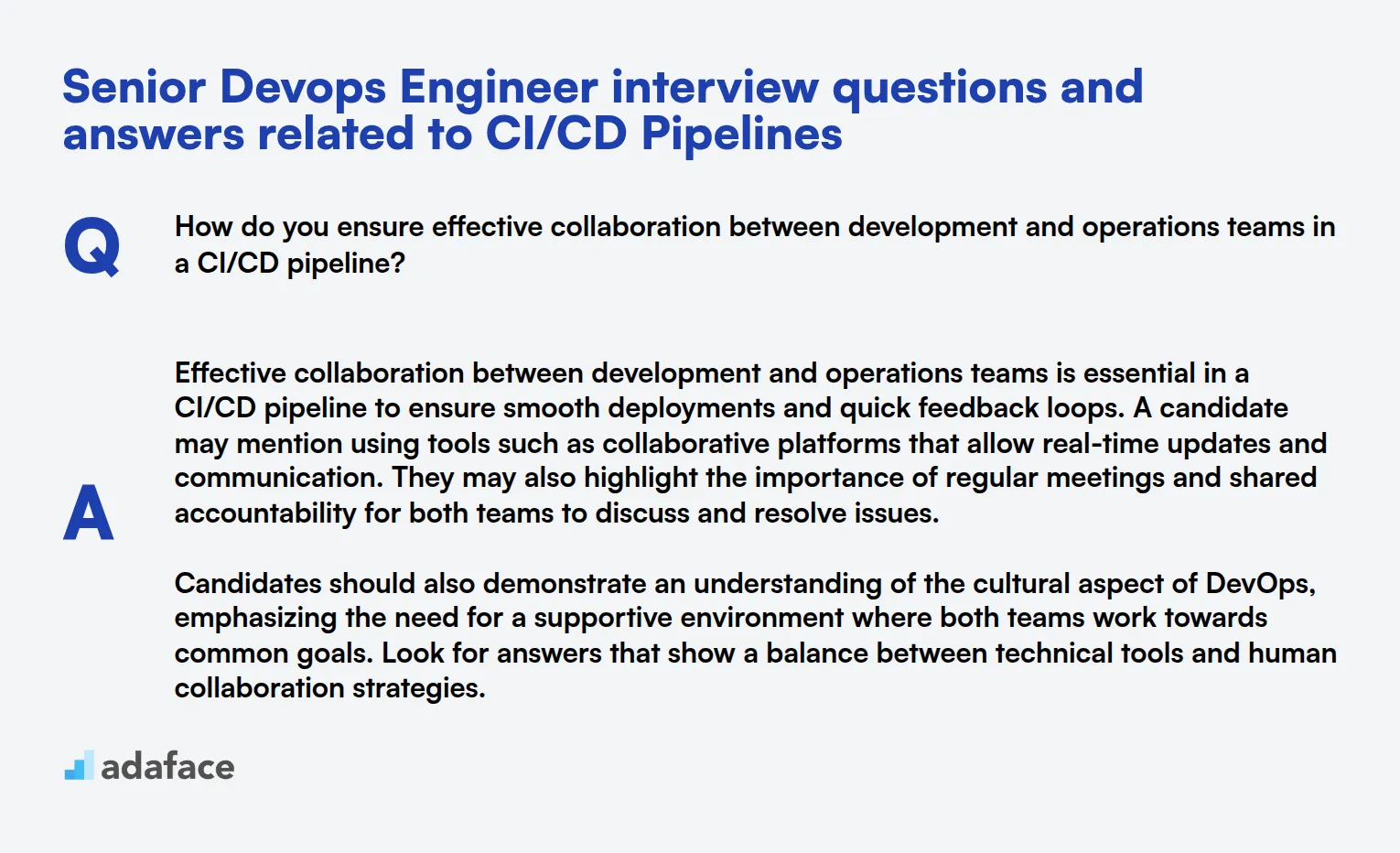
When it comes to hiring a Senior DevOps Engineer, understanding their proficiency in CI/CD pipelines is crucial. This list of questions will help you assess if your candidates have what it takes to manage, optimize, and troubleshoot these pipelines effectively.
1. How do you ensure effective collaboration between development and operations teams in a CI/CD pipeline?
Effective collaboration between development and operations teams is essential in a CI/CD pipeline to ensure smooth deployments and quick feedback loops. A candidate may mention using tools such as collaborative platforms that allow real-time updates and communication. They may also highlight the importance of regular meetings and shared accountability for both teams to discuss and resolve issues.
Candidates should also demonstrate an understanding of the cultural aspect of DevOps, emphasizing the need for a supportive environment where both teams work towards common goals. Look for answers that show a balance between technical tools and human collaboration strategies.
2. What steps would you take to troubleshoot a failing build in a CI/CD pipeline?
Troubleshooting a failing build is a common task in CI/CD pipelines. The candidate might start by examining the build logs to identify any errors or warnings. They could mention checking for recent changes in the codebase or configurations that might have caused the failure.
Candidates may also talk about isolating the problem by rolling back recent changes or running tests locally to replicate the issue. Look for problem-solving skills and a methodical approach to digging deeper into the root cause of the failure.
3. How do you ensure that your CI/CD pipeline is secure?
A secure CI/CD pipeline is critical to protect the integrity of code and applications. Candidates might discuss implementing access controls and ensuring that only authorized users can make changes to the pipeline. They could mention integrating security testing tools that automatically scan for vulnerabilities during the build process.
Look for responses that include a combination of automated security checks and manual reviews. An ideal candidate should also highlight the importance of educating the team about security best practices and keeping security measures up-to-date.
4. How do you handle environment-specific configurations in a CI/CD pipeline?
Handling environment-specific configurations is a crucial aspect of managing a CI/CD pipeline. A candidate may discuss using configuration files or environment variables that are dynamically loaded based on the deployment environment. They might also mention using secrets management tools to safely handle sensitive data.
Candidates should demonstrate an understanding of maintaining consistency across environments while allowing for necessary differences. Look for solutions that ensure configurations can be easily managed and updated without introducing errors.
5. What metrics do you find most useful for monitoring a CI/CD pipeline, and why?
Metrics are vital for monitoring the health and performance of a CI/CD pipeline. Candidates may mention metrics such as build success rate, deployment frequency, and lead time for changes. These metrics provide insights into the efficiency and reliability of the pipeline.
Look for candidates who not only identify relevant metrics but also explain how they use this data to drive improvements. An ideal response should include a focus on continuous improvement and how metrics help in identifying bottlenecks and optimizing the pipeline.
6. How do you ensure that your CI/CD pipeline can handle increased loads during peak times?
To handle increased loads during peak times, candidates might discuss auto-scaling infrastructure components or optimizing the pipeline to ensure efficient resource usage. They may also focus on stress testing and load testing to identify potential weaknesses ahead of time.
Look for candidates who can balance scalability with cost-effectiveness and who demonstrate proactive strategies for anticipating and managing peak loads. An ideal response would show foresight and preparedness in handling varying workloads.
7. How do you approach integrating new tools or technologies into an existing CI/CD pipeline?
Integrating new tools or technologies into an existing CI/CD pipeline requires careful planning and testing. Candidates may talk about evaluating the compatibility of new tools with the current setup and running a proof of concept to understand the impact of the integration.
An ideal candidate will discuss minimizing disruptions during integration and ensuring that the team is trained on new tools. Look for answers that reflect a thorough and strategic approach to integration, balancing innovation with stability.
12 Senior Devops Engineer interview questions about Infrastructure as Code
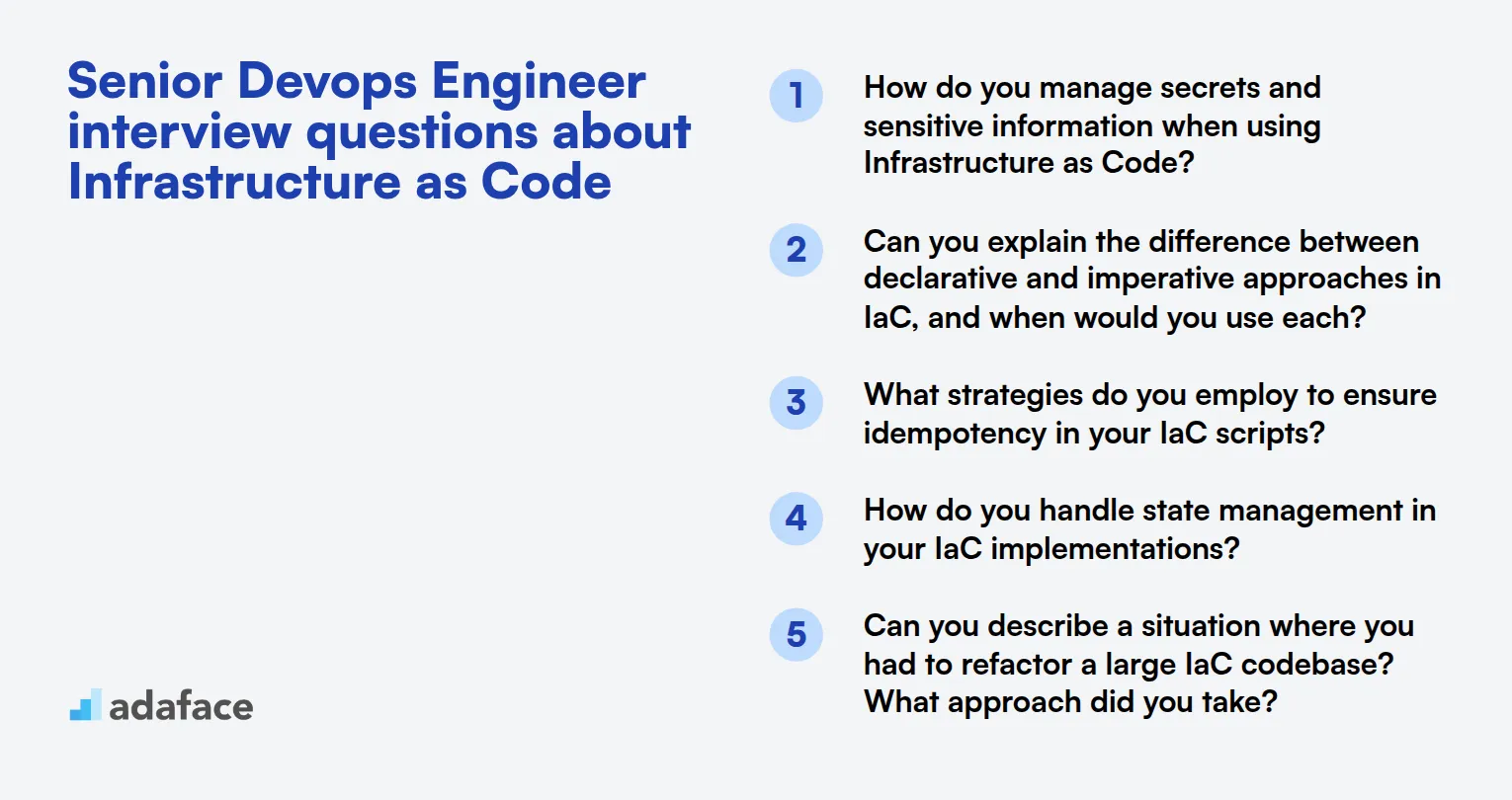
To assess a candidate's proficiency in Infrastructure as Code (IaC), use these targeted questions during your Senior DevOps Engineer interviews. These questions will help you evaluate the applicant's experience with IaC tools, best practices, and problem-solving skills in real-world scenarios.
- How do you manage secrets and sensitive information when using Infrastructure as Code?
- Can you explain the difference between declarative and imperative approaches in IaC, and when would you use each?
- What strategies do you employ to ensure idempotency in your IaC scripts?
- How do you handle state management in your IaC implementations?
- Can you describe a situation where you had to refactor a large IaC codebase? What approach did you take?
- How do you test your Infrastructure as Code to ensure it's working as expected?
- What are some best practices you follow when writing IaC templates?
- How do you handle versioning and change management for your IaC code?
- Can you explain how you would use IaC to set up a multi-region, highly available infrastructure?
- What tools do you use for static analysis of your IaC code, and why?
- How do you approach drift detection and remediation in your IaC implementations?
- Can you describe a time when you had to troubleshoot a particularly challenging issue in your IaC setup?
9 situational Senior Devops Engineer interview questions for hiring top Devops Engineers
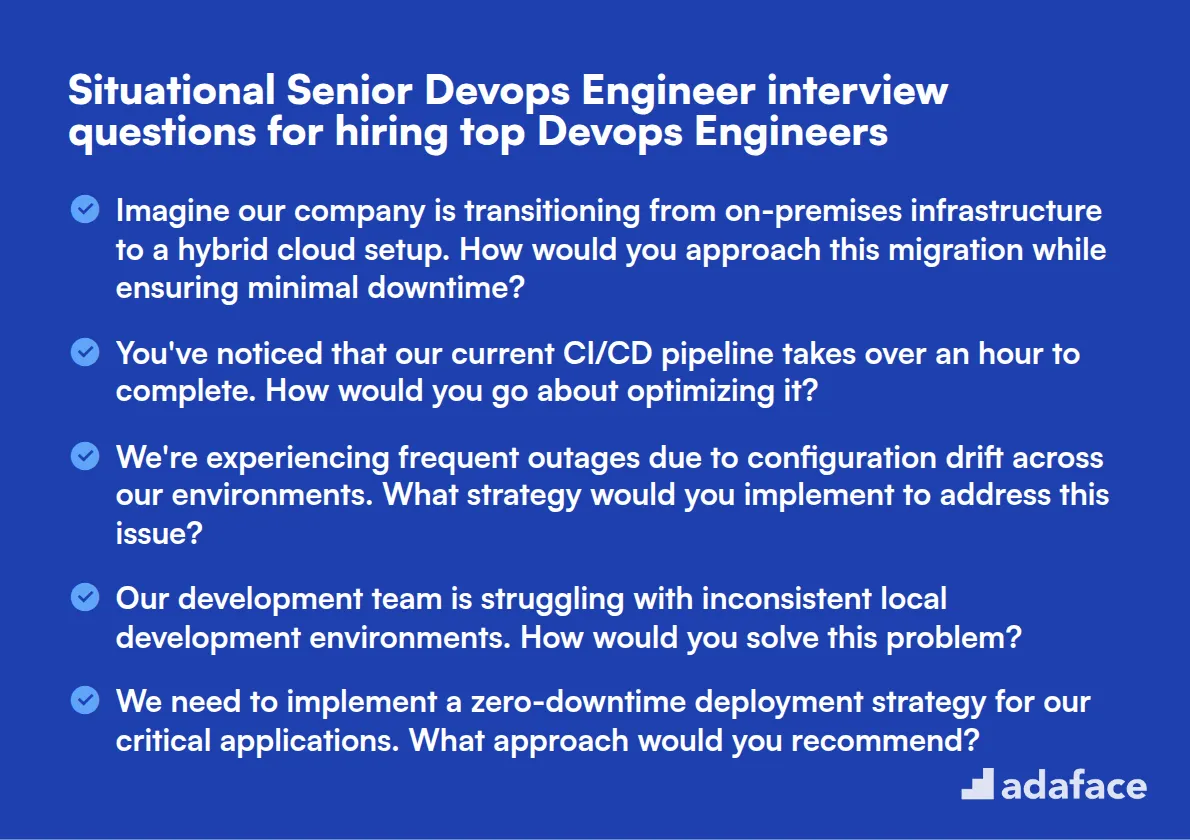
To assess a candidate's ability to handle real-world DevOps challenges, consider using these situational interview questions. These scenarios will help you evaluate a Senior DevOps Engineer's problem-solving skills, technical expertise, and decision-making abilities in practical contexts.
- Imagine our company is transitioning from on-premises infrastructure to a hybrid cloud setup. How would you approach this migration while ensuring minimal downtime?
- You've noticed that our current CI/CD pipeline takes over an hour to complete. How would you go about optimizing it?
- We're experiencing frequent outages due to configuration drift across our environments. What strategy would you implement to address this issue?
- Our development team is struggling with inconsistent local development environments. How would you solve this problem?
- We need to implement a zero-downtime deployment strategy for our critical applications. What approach would you recommend?
- Our cloud costs have been steadily increasing. How would you identify areas for optimization and implement cost-saving measures?
- We're experiencing performance issues with our microservices architecture. How would you approach diagnosing and resolving these problems?
- Our current monitoring setup is generating too many false positives. How would you refine our alerting system to be more accurate and actionable?
- We need to implement a disaster recovery plan for our mission-critical systems. What steps would you take to design and test this plan?
Which Senior Devops Engineer skills should you evaluate during the interview phase?
During the interview phase, it is challenging to assess every aspect of a Senior DevOps Engineer's capabilities comprehensively. However, focusing on key skills can significantly help in evaluating their proficiency and fit for the role. Here are some core skills essential to gauge in any Senior DevOps Engineer interview.
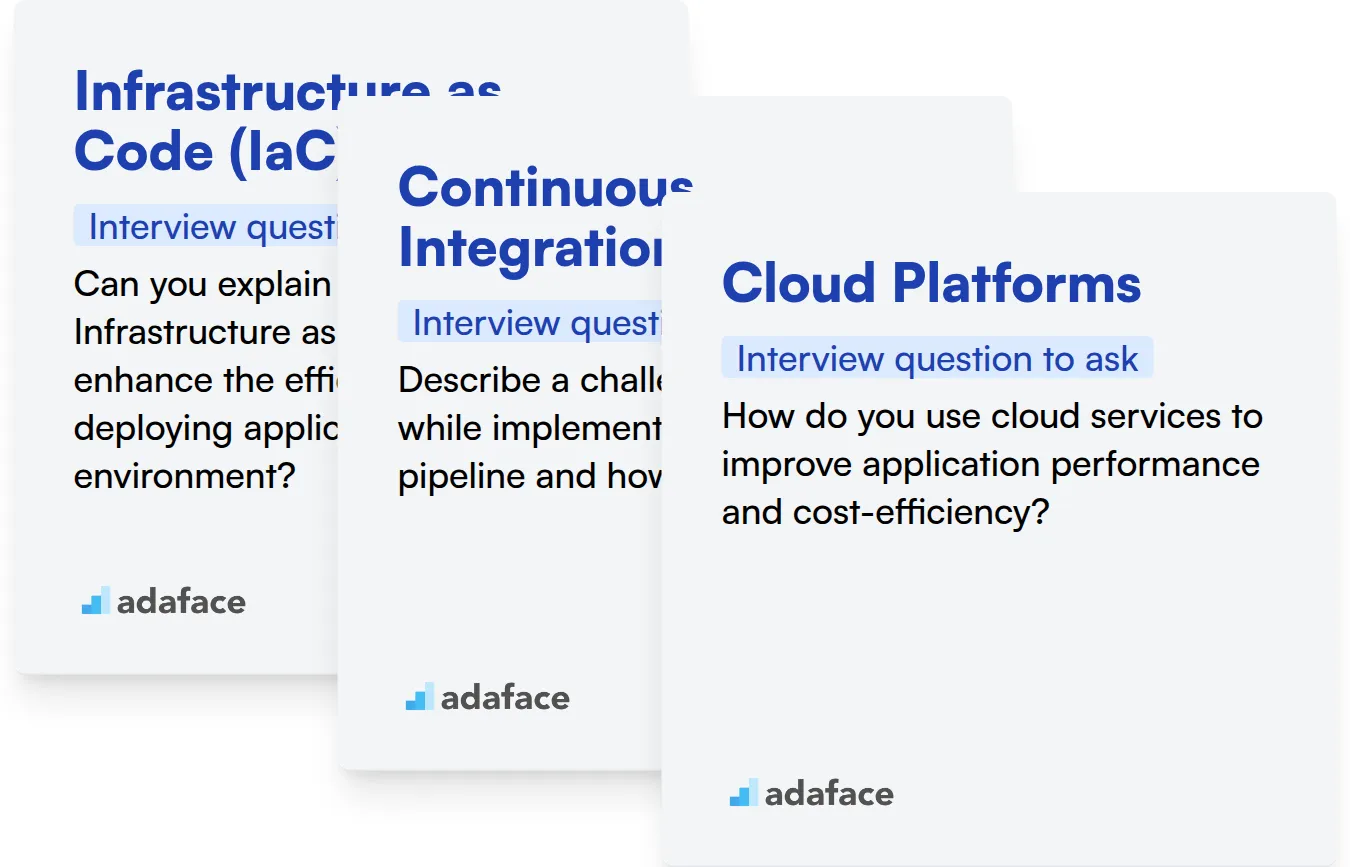
Infrastructure as Code (IaC)
Consider using an assessment test that includes relevant MCQs to filter this skill. To explore this, you can check out our DevOps Assessment Test.
You can also delve deeper into this skill by asking targeted interview questions specifically related to IaC.
Can you explain how Infrastructure as Code can enhance the efficiency of deploying applications in a cloud environment?
Look for candidates who can articulate clear examples of how IaC has been implemented in their past projects, mentioning specific tools like Terraform or CloudFormation and how these tools improved deployment efficiency.
Continuous Integration/Continuous Deployment (CI/CD)
An MCQ-based assessment can be valuable in identifying proficiency in CI/CD concepts and tools. Our Jenkins Test might be the right fit for this.
To further assess this skill, consider asking questions that evaluate the candidate's hands-on experience with CI/CD practices.
Describe a challenge you faced while implementing a CI/CD pipeline and how you overcame it.
Ideal responses will include specific challenges such as integration issues, testing bottlenecks, or deployment failures, and how the candidate addressed these with systematic approaches and tools.
Cloud Platforms
To filter candidates with strong cloud platform skills, consider using our AWS Test.
You can ask direct questions during the interview to assess their experience and understanding of cloud platforms.
How do you use cloud services to improve application performance and cost-efficiency?
Look for explanations that involve specific cloud strategies such as auto-scaling, load balancing, or serverless architectures, along with cost optimization techniques.
Hiring the Best Senior DevOps Engineer Candidates with Adaface
When looking to hire a skilled Senior DevOps Engineer, it's important to ensure that candidates possess the necessary skills and experience. This guarantees that they can contribute effectively to your team and handle complex DevOps challenges.
A reliable way to assess these skills is through targeted skill tests. We offer a variety of relevant tests such as the DevOps Online Test and AWS DevOps Test to help you evaluate candidates accurately.
Once you have utilized these tests, you can effectively shortlist the top candidates. This enables you to focus on interviewing those who have demonstrated their expertise in the field, saving you time and effort.
To take the next step in finding your ideal Senior DevOps Engineer, consider visiting our Online Assessment Platform to explore how Adaface can assist in your recruitment process.
DevOps Test
Download Senior Devops Engineer interview questions template in multiple formats
Senior Devops Engineer Interview Questions FAQs
Senior DevOps Engineers should have expertise in CI/CD pipelines, Infrastructure as Code, cloud services, and strong collaboration skills.
Ask candidates about specific tools they have used, challenges faced, and how they have optimized CI/CD processes in past projects.
Infrastructure as Code allows for automation, consistency, and scalability in managing infrastructure, ensuring faster and more reliable deployments.
Present hypothetical production issues and ask candidates how they would troubleshoot and resolve them, focusing on their problem-solving approach.
Inquire about the candidate's experience with AWS, Azure, or Google Cloud, and ask for examples of projects they have completed on these platforms.
Common challenges include integrating new tools, managing complex environments, ensuring security compliance, and balancing speed with stability.

40 min skill tests.
No trick questions.
Accurate shortlisting.
We make it easy for you to find the best candidates in your pipeline with a 40 min skills test.
Try for freeRelated posts
Free resources




